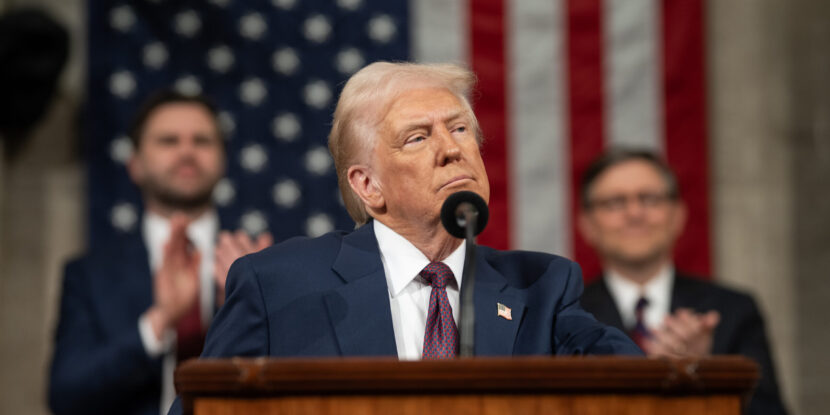HOW IT HAPPENED.
President Donald J. Trump‘s Big, Beautiful Bill has passed the U.S. House of Representatives by a single vote. Now, it heads to the Senate, where it will face significant changes before being reconciled ahead of a final vote. While the budget reconciliation bill faced opposition from a bloc of lawmakers in the House Freedom Caucus and a bloc of so-called moderate Republicans from New York, an eleventh-hour intervention by President Trump brokered a compromise that cleared the way for its passage.
The final stretch to pass the Big, Beautiful Bill in the House began early Wednesday morning when the House Rules Committee took up the legislation at 1:00 AM. The committee proceeded to work almost 24 hours straight, with Democrats offering a slew of poison pill amendments that had to be voted down by Republican committee members before House Speaker Mike Johnson (R-LA) brought what is called a “manager’s amendment.” The manager’s amendment contained last-minute alterations to the bill aimed at appeasing House Freedom Caucus members. At the same time, the moderate opposition had been assuaged earlier with a compromise on the legislation’s state and local tax deduction (SALT) cap.
After two major huddles with President Trump over the last two days, House Republicans, just before midnight on Wednesday, were ready to bring the Big, Beautiful Bill to the floor and begin the process for a final vote on passage. Early Thursday morning, President Trump’s budget plan, with provisions sought by both the House Freedom Caucus and the group of “moderate” Republicans from New York, passed the lower chamber in a vote of 215 to 214, with one abstention.
Only two Republicans voted against Trump’s budget plan, Reps. Thomas Massie (R-KY) and Warren Davidson (R-OH), while Rep. Andy Harris (R-MD), who chairs the House Freedom Caucus, abstained. Notably, the Democrats have lost three congressional seats since March due to the deaths of Reps. Sylvester Turner (D-TX), Raúl Grijalva (D-AZ), and Gerry Connolly (D-VA).
WHAT WAS IN IT?
Most of the significant provisions in the Big, Beautiful Bill, previously reported by The National Pulse, were left largely unchanged. The legislation makes the expiring provisions in the 2017 Trump tax cuts permanent, ensuring that Americans do not face a significant tax increase next April. Additionally, the bill still contains Trump’s campaign pledges for no taxation of tips, overtime, and social security.
However, to secure the votes of the New York Republican delegation—including Reps. Mike Lawler (R-NY), Andrew Garbarino (R-NY), and Nick LaLota (R-NY)—the cap on the SALT deduction was raised further to $40,000 for single filers, though it contains phase-outs for higher income earners. Conversely, the House Freedom Caucus secured significant changes to Medicaid and food stamp programs, including the addition of new work requirements that will begin in 2026. Other significant changes from the initial bill are expedited phaseouts of the green energy tax credits enacted under former President Joe Biden’s Inflation Reduction Act (IRA) and tweaks to a bevy of more niche tax provisions, including the standard deduction.
Importantly, the budget reconciliation bill provides significant funding for the Department of Homeland Security (DHS). This will allow for a rapid expansion in the number of U.S. Immigration and Customs Enforcement deportation agents, which currently number under 6,000. Likewise, the bill also contains the bulk of the Defense Department (DoD) budget—which effectively removes a key point of leverage for Senate Minority Leader Chuck Schumer (D-NY). Schumer has previously threatened to hold up appropriation bills for both DHS and DoD unless Republicans meet Congressional Democrats’ discretionary spending demands. Placing the DHS and DoD budgets in the Big, Beautiful Bill prevents Schumer from acting on this leverage.
WHAT IS NEXT?
The budget reconciliation bill now moves to the Senate, where it is expected to undergo significant changes, as the dynamics and policy priorities of the upper chamber of Congress differ from the House. Two critical aspects of the House bill that will likely face changes are its overall impact on the budget deficit and changes to Medicaid.
Fiscal hawks in the Senate want more substantial budget savings, which could mean that spending cuts are brought forward in the legislation’s budget window or current cuts are expanded. However, another bloc of Republican senators, including Sen. Josh Hawley (R-MO), have publicly signaled they are less keen on cuts or major changes to Medicaid, meaning the provisions fought for by the House Freedom Caucus could be nixed in the Senate.
Over the next several weeks, or so, Senate Republicans will piece together their version of the Big, Beautiful Bill and, under budget reconciliation rules, pass the legislation by a simple majority of the chamber. Senate Democrats are unable to filibuster legislation taken up under budget reconciliation.
After passage, the House and Senate will appoint members from each chamber to serve as conferees and reconcile the two different versions of the budget legislation. Republican leaders in Congress indicate they are currently aiming to have the final, reconciled bill passed through both chambers and on President Trump’s desk for his signature by July 4. That goal could end up being pushed back several weeks, with some believing July 31 would be the latest date for passage.


